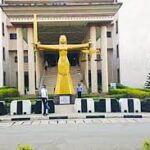By Felicia Imohimi
The International Fund for Agricultural Development (IFAD) says the Federal Government/IFAD Special Agro-Industrial Processing Zone (SAPZ) has expanded outreach and deepened community engagement across the country.
The IFAD Country Director, Dede Ekoue, who spoke at the joint FG/IFAD second SAPZ Programme Supervision Mission on Wednesday in Abuja, said a total of 41,204 smallholder farmers and value chain actors had been profiled.
Ekoue said that 7,398 of the farmers were captured in Kano State in the 2024 pilot scheme, while 33,806 were captured in the 2025 profiling in Ogun and Kano States.
She said that the profiling exercise formed the backbone of implementation, ensuring accurate targeting, evidence-based planning, and transparency in beneficiary support.
According to her, women account for 50 per cent of the profiled actors in Ogun while youths represent nearly a quarter in Kano State—an encouraging indication of SAPZ’s growing relevance to young agripreneurs.
“Since the last support, 14,655 of the 33,806 actors profiled in 2025 have already benefited from input support, training, and digital services such as the climate information services (CIS).
“Cumulatively, 15,664 individuals have been reached with training, nutrition packages and input packages since programme inception, comprising 9,353 men, 6,311 women, and 3,955 youth.
“Though this represents 15.8 per cent of the Life-of-Project target of 100,000 beneficiaries, it is clear that implementation is accelerating steadily.”
Ekoue described the meeting as a strategic moment of reflection, recalibration, and renewed commitment to accelerating Nigeria’s agricultural transformation agenda.
“The SAPZ programme stands as flagship collaboration between the Government of Nigeria, IFAD, and participating states.
“The SAPZ programme is not merely supporting farmers—it is building rural economies, unlocking agribusiness opportunities for youth, advancing food security, and strengthening Nigeria’s resilience in the face of global challenges.
“It is an initiative designed to structurally transform Nigeria’s food systems through enterprise development, agro-industrialisation, youth employment and inclusive rural prosperity.’’
She said IFAD remained fully aligned with the Renewed Hope Agenda and with national objectives to build efficient, resilient, and inclusive agricultural value chains.
“The SAPZ programme remains a strong demonstration of this alignment and an expression of shared ambition.
“We thank African Development Bank and Islamic Development Bank for their support.”’
Ekoue explained that the major anchor of SAPZ implementation had been the strengthening of Public–Private–Producer Partnerships through IFAD’s (4P) Model.
She said the programme had successfully established the Multistakeholder Agribusiness Forum (MAF).
The country director said that 25 Memoranda of Understanding had been signed, linking cassava, rice, tomato, and groundnut producers to guaranteed offtakers and agro-processors.
“These partnerships—bringing together private sector actors, implementing partners, financial institutions, and government agencies—ensure sustainability, improve market access, and reduce commercialisation risks to ensure farmers income are well safeguarded.
“SAPZ programme is also reinforcing its commitment to inclusion, gender equity, and nutrition-sensitive agriculture.
“To date, household —mostly women—have benefited from nutrition interventions, including sensitisation sessions, hygiene training, food demonstrations.
“This ensures that SAPZ is not only increasing production but also improving dietary diversity and family nutrition outcomes,” she said.
She said the supervisor mission was to validate progress, address emerging bottlenecks, harmonise state and federal priorities, and finalise the operational modalities required to meet the 2025 performance targets and accelerate implementation.
Mrs Iluromi Adebola, Director, Department of Development Partners Project, Federal Ministry of Agriculture and Food Security (FMAFS), identified the supervision mission as a platform to take a close, honest look at the progress achieved so far.
Adebola, who was represented by Dr Ahmed Abubakar, said the mission was also to review implementation bottlenecks, and jointly chart a clear, coordinated path that would accelerate results across all SAPZ states.
She identified SAPZ as a flagship intervention of government, representing the collective ambition to move Nigeria from merely producing agricultural commodities to processing them competitively for domestic and export markets.
“Nigeria’s agricultural system has suffered for decades from limited processing capacity and weak market linkages.
“The SAPZ model directly addresses these gaps by connecting producers to processors, logistics, storage, and market systems.
“This is why it is a cornerstone of the agricultural industrialisation agenda of the Federal Government,” she said. (NAN)(www.nannews.ng)
Edited by Chijioke Okoronkwo












